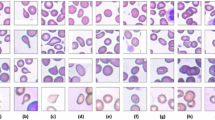Abstract
IN this laboratory, from time to time, we come across an anti-sheep cell hæmolytic serum from rabbits which causes rapid agglutination and sedimentation of sheep red blood cells. This is undesirable from the serologist's point of view. A sample of such Serum was recently tested against fifteen random samples of sheep cells, and the latter, on the basis of agglutinability, could be sharply divided into two groups. We do not, of course, regard this observation as original, but merely wish to stress its importance for serologists and especially also for commercial firms dealing in bacteriological laboratory material. It might be well to define the group to which belonged the red cell antigen used in preparing a given hæmolysin, two or more groups having been determined on the basis of response to immune agglutinin. Incidentally, we pursued the line suggested by the above observation, and found that there are at least two ‘blood groups’ amongst purebred Australian merino sheep.
This is a preview of subscription content, access via your institution
Access options
Subscribe to this journal
Receive 51 print issues and online access
$199.00 per year
only $3.90 per issue
Buy this article
- Purchase on SpringerLink
- Instant access to full article PDF
Prices may be subject to local taxes which are calculated during checkout
Similar content being viewed by others
Author information
Authors and Affiliations
Rights and permissions
About this article
Cite this article
DUHIG, J. Blood-Groups among Australian Merino Sheep. Nature 126, 59 (1930). https://doi.org/10.1038/126059b0
Issue date:
DOI: https://doi.org/10.1038/126059b0
This article is cited by
-
Raman Spectra of Some Triatomic Molecules
Nature (1930)



